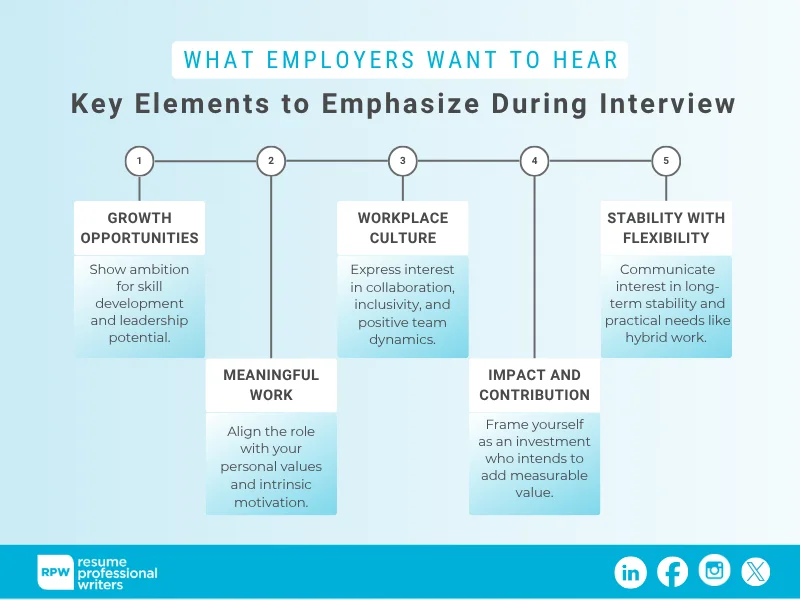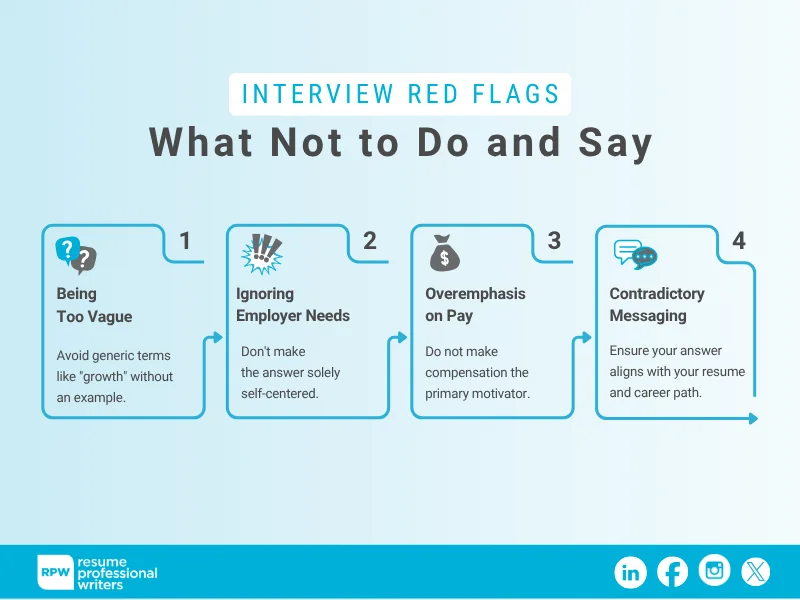Many candidates struggle when asked one of the most common yet deceptively challenging interview questions: “What are you looking for in a job?” Recruiters and hiring managers use this question to gauge alignment between an applicant’s goals and the company’s mission. Without a thoughtful response to “what are you looking for in a job?”, even highly qualified professionals risk sounding unprepared, unfocused, or misaligned with organizational needs.
Professionals across industries—from recent graduates and career changers to executives and transitioning military personnel—encounter this critical question in interviews and performance discussions. Career coaching and resume expertise are consistently emphasized for their significance. This guide explores the deeper purpose behind the “what are you looking for in a job” question, employer expectations, and actionable strategies so that job seekers can craft responses that resonate. It explains what hiring teams evaluate, provides guidance on preparing authentic answers, and helps align career aspirations with opportunities when addressing the “what are you looking for in a job?” question during an interview.

Why Employers Ask, “What Are You Looking for in a Job?”
This question is not a filler. It serves as a strategic tool to assess compatibility between company offerings and candidate expectations. Hiring managers want to determine whether an applicant will stay engaged, add value meaningfully, and remain long-term. An answer to “what are you looking for in a job?” that connects career goals with organizational success signals readiness and foresight.
Employer motivations typically fall into three categories:
- Alignment with Role’s Responsibilities: Employers want to evaluate alignment with the role’s responsibilities. For example, a candidate seeking rapid leadership growth may not fit an entry-level administrative post.
- Cultural Compatibility: The question highlights cultural compatibility. If a candidate values autonomy while the company nurtures highly collaborative environments, mismatches could result in quick turnover.
- Self-Awarness: It tests whether professionals understand their own drivers—self-awareness is attractive to employers because it indicates thoughtful career planning.
According to the U.S. Bureau of Labor Statistics, annual voluntary turnover has reached about 26.4% in 2024 across all industries. High attrition rates elevate the importance of evaluating long-term fit. Employers prefer candidates who can articulate expectations around growth, team dynamics, and impact, showing they have considered what motivates professional satisfaction.
Key Factors Job Seekers Should Emphasize in Their Answer
While every professional’s motivation is unique, several universal themes resonate with recruiters across sectors. Clear, concise articulation of these priorities strengthens credibility and reduces ambiguity.
- Growth Opportunities: Employers value candidates focused on skill development, leadership potential, and learning pathways. Expressing interest in advancement demonstrates ambition balanced with loyalty.
- Meaningful Work: Professionals who emphasize alignment of roles with personal values signal intrinsic motivation, which leads to higher engagement and productivity.
- Workplace Culture: Citing interest in positive team dynamics, collaboration, or inclusivity illustrates adaptability. Workplace culture fit remains one of the top factors recruiters assess.
- Stability with Flexibility: Organizations understand modern employees’ desire for long-term security combined with flexibility around schedules or hybrid work. Candidates who communicate this balance appear pragmatic.
- Impact and Contribution: Referencing contributions to organizational success assures employers that the applicant intends to add measurable value rather than just receive benefits.
Each factor must be framed realistically. Overemphasizing lifestyle perks while neglecting professional contributions may disengage interviewers. Balanced language acknowledges both individual and employer priorities.

How to Structure a Strong Response
A structured response blends authenticity with professionalism. Candidates should begin by briefly identifying broader motivators before narrowing their focus to company-specific aspects. This dual structure proves self-awareness and research.
- Start with Core Motivations: Mention universal drivers such as professional growth, collaboration, or impact. This positions the answer to “what are you looking for in a job?” as thoughtful rather than transactional.
- Connect to the Role: Emphasize how the current opportunity matches those motivators—such as advancing technical skills in an IT environment or driving patient outcomes in healthcare.
- Tie to the Company: Reference specific cultural qualities, leadership programs, or industry distinctions. This shows preparation and reduces the risk of generic answers to “what are you looking for in a job?”.
- Close with Value Addition: Reinforce how personal goals and company objectives overlap, framing the candidate as an investment rather than a risk.
Recruiters recall responses that go beyond clichés. For example, instead of stating “seeking growth,” a more impactful phrasing would be “seeking a role that leverages existing project management expertise while providing opportunities to expand into cross-functional leadership.” Specificity ensures credibility.
Examples Tailored to Different Professions
Since industries differ in priorities, tailoring answers ensures precision. Consider how the question “what are you looking for in a job?” might be answered across varying roles in the United States and Canada:
- Healthcare Professionals: Emphasize patient impact, innovation in care, and continuous learning through certifications and hospital programs.
- IT and Technology Specialists: Highlight skill expansion in advanced tools, involvement in transformative projects, and collaboration with agile teams.
- Finance and Accounting Roles: Focus on accuracy, compliance standards, professional certifications such as CPA or CFA, and structured growth paths.
- Educators: Reference student success, inclusive teaching environments, and district-supported professional development initiatives.
- Federal Employees: Stress interest in mission-driven service, adherence to compliance frameworks, and stability within structured career ladders.
- Executives: Underscore transformational leadership, strategic growth, and impact on organizational positioning in the market.
Mistakes to Avoid When Answering
Despite preparation, many applicants fall into predictable pitfalls. Identifying these mistakes ensures stronger delivery and sustained interviewer engagement.
- Being Too Vague: Generic responses like “growth” or “stability” without substance lack depth and suggest insufficient preparation.
- Overemphasis on Compensation: While salary is important, making it the primary motivator conveys transactional intent rather than career alignment.
- Ignoring Employer Interests: A solely self-centered response may signal poor team fit. Employers expect reciprocity—how goals align with contributions matters.
- Contradictory Messaging: Answering “what are you looking for in a job?” in ways inconsistent with a resume or career trajectory undermines credibility.
The best strategy is balancing transparency with professionalism. Stating compensation as “valuing competitive pay in line with industry standards while motivated by continuous learning” frames priorities constructively.

Unleash Potential by Aligning Purpose with Professional Fit
Answering “What are you looking for in a job?” effectively shows self-awareness, alignment with company values, and a commitment to long-term growth. By focusing on professional development, workplace culture, and meaningful contributions, candidates can deliver responses that stand out and leave a lasting impression.
Take the next step in your career with expert guidance. Our professional resume writing services provide the tools you need to craft authentic responses and showcase your value. Contact us today to move closer to your career goals.
Frequently Asked Questions
Why do recruiters ask about what candidates are looking for in a job?
Recruiters ask “what are you looking for in a job?” to assess motivation, cultural fit, and long-term engagement. It helps them identify whether candidates will remain satisfied and aligned within the organization.
How specific should an answer be when explaining career goals?
Specificity improves credibility. General answers indicate poor preparation, while tailored responses demonstrate self-awareness and thoughtful planning that employers appreciate.
Is it acceptable to mention salary expectations in the response?
Yes, but salary should not dominate the response. It is best framed as one consideration among others, complemented by growth, contribution, and career development goals.
How do industry differences affect interview responses?
Each industry values different motivators. Healthcare emphasizes patient outcomes, IT emphasizes innovation, and federal jobs emphasize mission-driven service. Responses should be tailored accordingly.
Can this question also apply to internal promotions?
Yes. Internal promotion interviews also use the question “what are you looking for in a job?” to determine how an employee’s direction aligns with advancing within the same organization and taking on expanded responsibilities.







